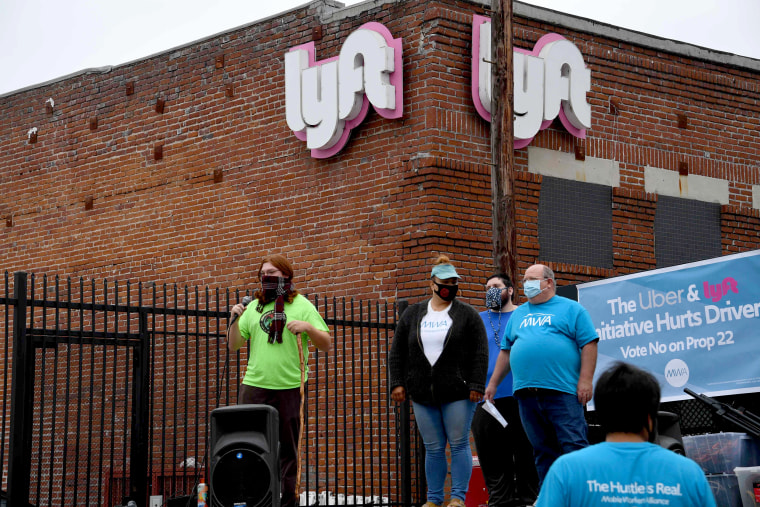A California state judge on Monday struck a major blow against Uber and Lyft, ruling that the ride-hailing companies are most likely not exempt from a state law that defines their drivers as employees rather than contractors.
The judge found that there was an “overwhelming likelihood” that these companies have been misclassifying their drivers as contractors rather than employees based on a law that took effect Jan. 1, 2020, and sought to clarify the difference in how workers are classified.
By classifying their drivers as independent contractors, Uber and Lyft have avoided providing drivers with state-mandated benefits such as unemployment. During the pandemic, many drivers who weren’t able to work have sought unemployment benefits but were told they did not qualify until the federal government stepped in with the Coronavirus Aid, Relief and Economic Security Act.
“This is a great victory for the state of California, for the attorney general, and the rule of law generally,” said William Gould, a law professor at Stanford University.
Gould, a labor law expert, served as the chairman of the National Labor Relations Board from 1994 to 1998.
“I think that consumers, and citizens of California generally, can and should welcome this decision,” he continued.
Uber and Lyft are two of the companies that helped spark the "gig economy," in which platforms provide access to work such as driving vehicles, cleaning residences and even taking care of pets. But as the companies have matured, they have also been confronted by labor activists and politicians who have argued that the system does not adequately support workers who might otherwise be eligible for benefits and greater job security if they were legally considered to be employees.
Previous lawsuits brought by aggrieved drivers have not resulted in any substantive change in the companies’ practices. But this new case, People of the State of California v. Uber and Lyft, may result in a substantially different outcome.
The ruling comes as part of a lawsuit brought just three months ago by California Attorney General Xavier Becerra along with the city attorneys from San Francisco, Los Angeles and San Diego. It accuses the companies of violating a new state law known as “AB5.” If a court ultimately rules against the companies, they could potentially owe huge penalties and substantial restitution to California drivers.
“Today’s ruling is a milestone in protecting workers and their families from exploitation by Uber and Lyft,” San Diego City Attorney Mara Elliott said in a text message.
Lyft spokesman CJ Macklin said by email that the company vowed to appeal the judge’s ruling, but declined to explain on what grounds it would do so.
Davis White, an Uber spokesman, said that Uber also planned to appeal the ruling, though he did not include any preview of the company’s legal counterarguments.
The companies have previously warned that forcing them to classify drivers as employees threatens their business models and their ability to provide flexible work for the drivers.
In the 34-page order granting the California attorney general’s motion for preliminary injunction — finding that the ride-share companies have likely run afoul of AB5 and the 2018 California Supreme Court decision upon which it is based. In that case, known as Dynamex, workers are assumed to be employees unless all parts of a three-part test are met. The AB5 law was drafted to enshrine this court decision into state law.
Judge Ethan Schulman of the San Francisco County Superior Court wrote that the companies’ claims that they are not transportation companies “flies in the face of economic reality and common sense.”
“To state the obvious, drivers are central, not tangential, to Uber and Lyft’s entire ride-hailing business,” he wrote.
The ruling came the same day that Uber’s CEO, Dara Khosrowshahi, wrote an opinion piece in The New York Times arguing for a so-called third way, where “all gig economy companies need to pay for benefits, should be more honest about the reality of the work and must strengthen the rights and voice of workers.”
Additionally, Schulman ordered that enforcement of his order would be held for 10 days pending appeal.
San Francisco City Attorney Dennis Herrera said the ruling was an important step toward forcing the companies to count its drivers as employees.
"This is a victory not only for every driver who has been denied fair wages and benefits by Uber and Lyft, but for the public at large," Herrera wrote in an email. "For too long these companies have denied their drivers basic workplace protections, like minimum wage and sick leave, and illegally shifted that burden onto taxpayers. Uber and Lyft have pocketed millions of dollars by leaving drivers in the lurch and taxpayers to foot the bill. That ends now."

